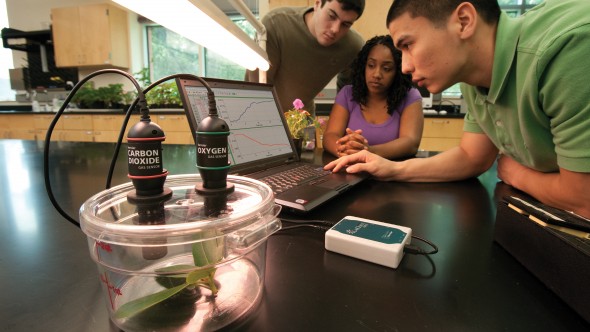Independent Student Projects
 |
This
multi-week “performing inquiry” lab has students
proposing, designing, conducting, writing, and
presenting a scientific research project of
their own design. On-going
peer-review/critique of student research
proposals, articles and presentations allows
students to experience how the scientific
community establishes the validity of scientific
knowledge. In this way students experience
the power that science has to reveal the
workings of the natural world, the dynamic
nature and tentativeness of this knowledge, and
how the scientific community operates to
establish the validity of scientific
knowledge. |
Lab Summary
During this multi-week investigation students
literally become practicing scientists by proposing,
conducting, presenting biological experiments of their
own design. In order to manage this process given the
material and time constraints of most labs, students
are asked to limit their question to one that relates
to metabolism (photosynthesis and/or cellular
respiration) in plants, and how natural variation they
observe among individuals may influence these
metabolic processes and their connections to
productivity. Students are encouraged to explore
questions that are of interest to them, or that are in
some way related to real‐world issues they may be
exploring in class. Once students develop their
questions, they are asked to develop a research
proposal. Their proposals are then peer‐reviewed by
other teams in the class and the lab instructor.
Feedback from their peers is then addressed and over
the course of 3 weeks teams implement their research
proposals. Each member of the team writes a draft
scientific article, which is also peer-reviewed.
Revised articles have the opportunity to be published
in our Journal of Undergraduate Biological
Investigations (JUBI). The independent projects
culminate in a research symposium in which students
share their research with their classmates.
Conceptual Learning Objectives - Upon
completion of this multi-week lab, students should be
able to
- discuss the metabolic connections between cellular respiration and photosynthesis influence productivity, and on how environmental, physical, developmental variation among plants can influence these metabolic processes and therefore productivity.
Scientific Skills - During this independent
project students will (with continued feedback from
their peers and the lab instructor)
- formulate a biologically-based question.
- develop a properly formatted conceptually (using concepts explored in introductory biology) justified experimental hypothesis and prediction.
- develop an experiment which
- properly assigns a dependent and independent variables
- has proper control groups (negative & positive where appropriate) and controls variables across treatments and trials.
- properly controls for selection bias in assigning subjects to treatments.
- provide a detailed and conceptually accurate explanation of the conceptual relations between the biological processes and a quantitative measures of that process used in their experiment.
- record, organize, sort and graph data in a MS Excel spreadsheet
- choose the appropriate graph to summarize data where the dependent and independent variables are both continuous measurement variables.
- choose the appropriate type of inferential statistical analysis to perform on data from an experiment of their own design.
- generate and Interpret other relevant descriptive statistics: r2, slope of a best fit linear equation, measures of variation (standard deviation or error).
- use appropriate inferential statistical tests (SLR, t-test, Chi-square) performed in MS Excel (or StatPlus for Mac) to analyze data.
- draw conclusions from their data analysis using biological concepts explored in an introductory biology course and/or primary literature research.
- communicate experimental research findings in both written (scientific article) and oral (research symposium presentation) formats.
- provide thoughtful and accurate evaluation of the merits of research proposals and articles developed by other teams in the class.
Learning Theory & Pedagogy
The focus of this
multi-week investigation is to build on students
understanding of how science is done by having
them experience the entire process of science from
(hypothesis formation, aspects of experimental
design and predictions) up to the students. Asking
good (biologically relevant) questions,
formulating informed hypotheses and experimental
predicitions, and devising effective procedures
are among the most creative and also challenging
aspects of science. Allowing students to
have an authentic science experience, early in
their academic career, can help students begin to
decide whether or not basic or applied scientific
research is of interest to them
professionally. In fact, even for those who
will not become practicing scientists, the
problem-solving nature of science and the
intellectual skills employed are easily
transferable to other fields/disciplines.
Students require practice employing these
important intellectual skills and they require
constant feedback on their progress. This
independent project lab experience utilizes a
peer-review process to do this. The process
purposefully mimics how the professional
scientific community scrutinizes the ideas/work of
their peers and is intended to help students understand
how the scientific community validates knowledge
as accurate or judges the likelihood of success, merit, and importance of
proposed research ideas. This project has found
that students are more likely to use scientific
knowledge to inform their decisions about
science-related issues when they also understand
the limitations of this knowledge and the lengths
to which the community of professional scientists
have gone to establish its accuracy.
Instructional Resources
- An instructor guide which provide lab instructors with lab preparation instructions, suggested materials, learning theory and pedagogical suggestions.
- A PowerPoint tutorial which introduces students to fundamental aspects of plant metabolism, the energetic connections between photosynthesis and respiration in plants and how to use the CO2 uptake/release method to estimate GPP and NPP.
- Lab manual appendix that teach students how to use the Vernier data loggers and gas sensors.
- Lab manual appendix exploring experimental design, descriptive statistics, graphing and inferential statistics using MS Excel.
Required Materials
- Vernier data loggers and CO2 gas sensor
- Team computers with MS Excel
- High intensity (>1600 lumen) florescent bulb lamps
- Other
Vernier sensors can also be made available for
use in individual projects (light intensity,
salinity, PAR, soil moisture, temperature
etc.) Visit Vernier
for a list available sensors.